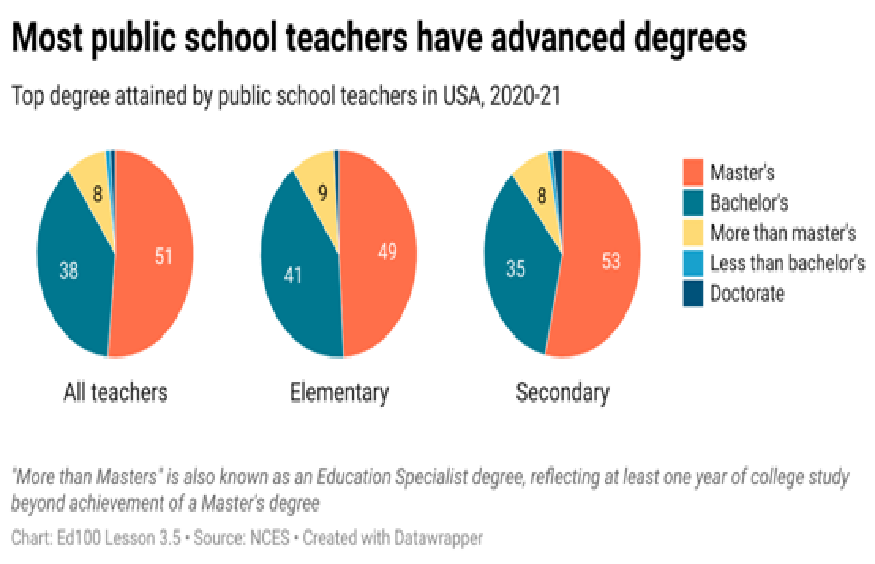Master of Arts in Education equips educators with cutting-edge skills to enhance their educational techniques, leadership styles, and overall impact on education. This degree opens up a wide range of professional options, such as teaching, administration, and specialized teaching roles. Read on to examine the essential elements of an MA program as well as its top eight benefits in this post.
Eligibility Criteria For Pursuing MA In Education
Candidates must meet the education eligibility requirements to be admitted to an MA program. They are listed in the following order:
- A bachelor’s degree from an accredited university
- Prior credits for past study and life experience are available
- English Level: It is preferred to have at least 55% of your high school grades in English or to study all courses in English at IELTS Level 5.0
- Proficiency in Internet surfing, Microsoft Word, and online research is required
Reasons Why You Should Pursue An MA In Education

Source: ed100.org
Here are a few reasons why candidates might consider earning an advanced degree:
1. You Gain New Skills And Opportunities
Acquiring a master’s degree in education equips educators with supplementary competencies in leadership, educational research, assessment procedures, innovative school methods, diversified instruction, and meeting the needs of students from many cultural and linguistic backgrounds.
Additionally, as your teaching abilities advance, so will your prospects for leadership.
2. You Stay Up-To-Date On Recent Educational Trends
The majority of teachers have a strong interest in education and are knowledgeable about the most effective techniques to help their pupils. One of the best ways to stay up to date on the latest research is to return to graduate school.
Additionally, you will learn about fresh, research-backed techniques that can improve productivity, success, and efficiency in the classroom.
3. Offers You Higher Salaries
The majority of school districts will bargain for greater pay for instructors with advanced degrees because they desire a staff with a high level of education.
Pay increases will often cover the expense of the degree in a few years.
4. Opens Doors To New Opportunities
Teachers who get a master’s degree are prepared to hold leadership positions in their districts and schools. A graduate degree can lead to employment as an instructional coach, curriculum expert, teaching leader, or in many other leadership positions in education. You’ll delve extensively into leadership and self-reflection subjects.
And you’ll think about how your leadership is affecting others. An M.A. in Education will not let you down, whether your goal is to take on formal leadership roles or you just want to be prepared for chances when they present themselves.
5. You Can Have A Big Impact In The Classroom
Teachers are urged to implement the research findings in their work environments as they study it. They frequently discover that their classes develop into innovative and exploratory spaces.
When educational research is used as a launchpad, remarkable outcomes can occur as kids reach new heights and this success inspires instructors and keeps them from burning out.
6. You Can Explore Your Area Of Interest
Concentration areas are available in many graduate education programs. This offers you the chance to concentrate on a subject you are enthusiastic about and highlight it on your CV. A work-based learning credential is one illustration of how teachers may assist students in making the transition from education to the workplace.
For individuals who wish to obtain extra qualifications for teaching abroad or in an IB school, an international baccalaureate specialization is an alternative option. If you’re thinking about becoming a school administrator, you can start an Ed.D. program with an educational leadership specialization or a principal or superintendent license. You may frequently even pursue a bespoke emphasis, such as a literacy concentration, that is tailored to your particular interests.
7. You Build Your Network And Gain Connections
Among a group of instructors who are probably from all over the world, you will form bonds. These connections last long after the classes are over.
Additionally, professors are prepared and eager to introduce themselves and respond to queries.
8. You Develop Your Leadership Skills
Developing leaders in the area of education is a major focus of many master’s degrees in education. As a result of your advanced training, you will become the teacher in your school that other teachers look up to when they have queries or worries regarding their students.
Additionally, you will become more assured of your capacity for decision-making in the classroom, which will inevitably improve your leadership abilities outside of it.
9. You can Try Out New Roles
You should get a master’s degree, particularly in administration or leadership, if you see yourself in a leadership position in education. The minimal degree required for administrators in elementary and secondary schools is usually a master’s degree.
Applying for one of these leadership posts requires the proper training, as they are highly competitive positions.
10. Keep You Competitive
You should get a master’s degree, particularly in administration or leadership, if you see yourself in a leadership position in education. The minimal degree required for administrators in elementary and secondary schools is usually a master’s degree.
Applying for one of these leadership posts requires the proper training, as they are highly competitive positions. Your colleagues, administrators, and the parents of your pupils may be more receptive to you because of your enhanced abilities and expertise. Your graduate-level expertise may provide you with more opportunities to lead committees and participate in policy debates.
Be Future Ready With A Master’s Degree
Obtaining a master’s degree in teaching may provide educators with access to advanced methods, specialized information, and leadership positions, which can have a profound impact on their lives. In addition to enhancing teaching techniques, a master’s degree offers doors to a multitude of positions and career choices in the education industry. By investing in an MA degree, educators may significantly impact students’ lives, contribute to educational change, and further their professional growth.



